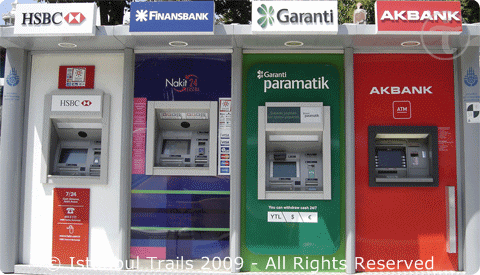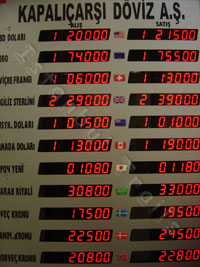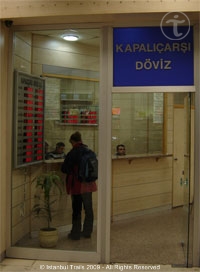With some 25 million visitors finding their way to Turkey every year, tourism is a key player in the country’s economy.
Since tourists shouldn’t encounter any difficulties spending their money, all options are open: cash, credit cards and maybe even still traveler’s cheques. But what is the most sensible way to bring your money along?

The Turkish Currency
Turkey is not a member of the European Union (yet?), hence has its own currency. Luckily for you, as recent as 2005, they switched from the Turkish Lira to the New Turkish Lira (Yeni Türk Lirası – YTL, or more officially TRY). They dropped six zeroes of the old banknotes which is great news for the average tourist who is not used to pay millions for just a can of coke. Together with the introduction of the New Turkish Lira came of course new banknotes and coins. The backside is that they are Euro look-alikes and unfortunately worth a bit less.
On January 1st 2009 the New Turkish Lira (YTL) again became the Turkish Lira (TL). Although this was merely a planned return to the original name of the Turkish currency, again new banknotes and coins were introduced. The current versions are a spitting image of the Euro, so be careful!
Cash Money
 You can bring as much cash money as you want into the country, regardless whether they are Turkish Liras or any foreign currency. However, the Turkish law states that you may take only up to $5000, or the equivalent in another currency, back out of the country!
You can bring as much cash money as you want into the country, regardless whether they are Turkish Liras or any foreign currency. However, the Turkish law states that you may take only up to $5000, or the equivalent in another currency, back out of the country!
If you choose to take cash money with you, bring hard currencies such as Euros or Dollars. For starters, the value of the Turkish Lira fluctuates on a daily basis. Secondly, you get better exchange rates inside Turkey than in your own country.
You can change foreign currencies in banks or exchange offices. You’ll find plenty of both all around the city.
Exchange Offices & Banks
 I strongly suggest to change your foreign currencies in exchange offices (Döviz). They don’t have long queues, stay open much longer, are available on Saturdays and offer better rates than banks. The latter is of course only true if you don’t take the ones located in the airport or close to tourist attractions in Sultanahmet. No commission will be charged for cash currency exchanges.
I strongly suggest to change your foreign currencies in exchange offices (Döviz). They don’t have long queues, stay open much longer, are available on Saturdays and offer better rates than banks. The latter is of course only true if you don’t take the ones located in the airport or close to tourist attractions in Sultanahmet. No commission will be charged for cash currency exchanges.
Most banks on the other hand are only open on weekdays and no later than 17:30. They will charge a commission to exchange money, unless you exchange big amounts, in which case they may offer a good rate too. The most important banks are Garanti Bankası, Fortis, Akbank, Yapı Kredi, HSBC and Finansbank.
Traveler’s Cheques
I have personally never used traveller’s cheques and therefore can’t testify how easy or difficult it is to use or exchange them. And let’s be honest, who still needs them these days. I’ve been told that it’s hard to cash them and that pretty steep commission fees are charged.
Credit Cards & ATMs
Sure, it’s always wise to carry some cash as backup, but why hassle with all of the above? All major credit cards (VISA, MasterCard, Diners Club, American Express) are widely accepted in shops, restaurants and hotels.
On top of that, you’ll find ATMs on virtually every corner of the street to withdraw some cash money for small expenses or tipping. These cash points accept not only all major credit cards, but also your regular bank cards provided they are linked into the Maestro, Cirrus or Plus network. The ATMs have menus in Turkish and English and supply TL’s.
If the ATMs connection line is not reliable, you may come across an error message saying that the transaction was refused by your bank. No need to panic, in most cases this is not the fact. Just move on to another ATM and try again.
Bottom Line
If you plan to buy your visa at the Turkish border, bring that exact amount of cash with you. Add to that a small amount of Euros or Dollars to get by in case of emergency and an even smaller amount to exchange at the airport so you are able to pay the taxi or bus driver who brings you to your hotel. For all other expenses, rely on your credit cards. Make sure you have memorized your PIN code(s) if your credit cards are equipped with a chip!
Comments on this entry are closed.